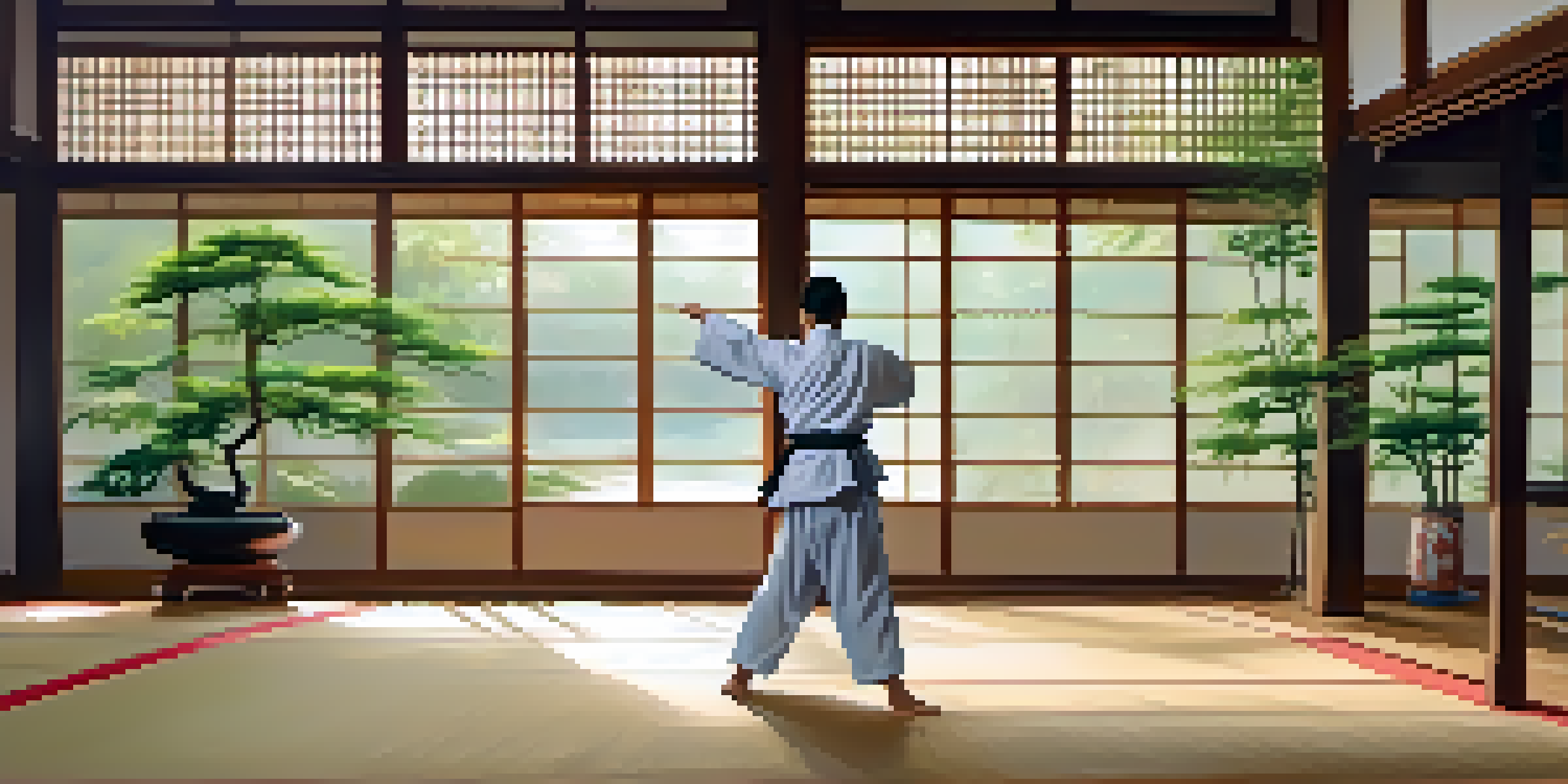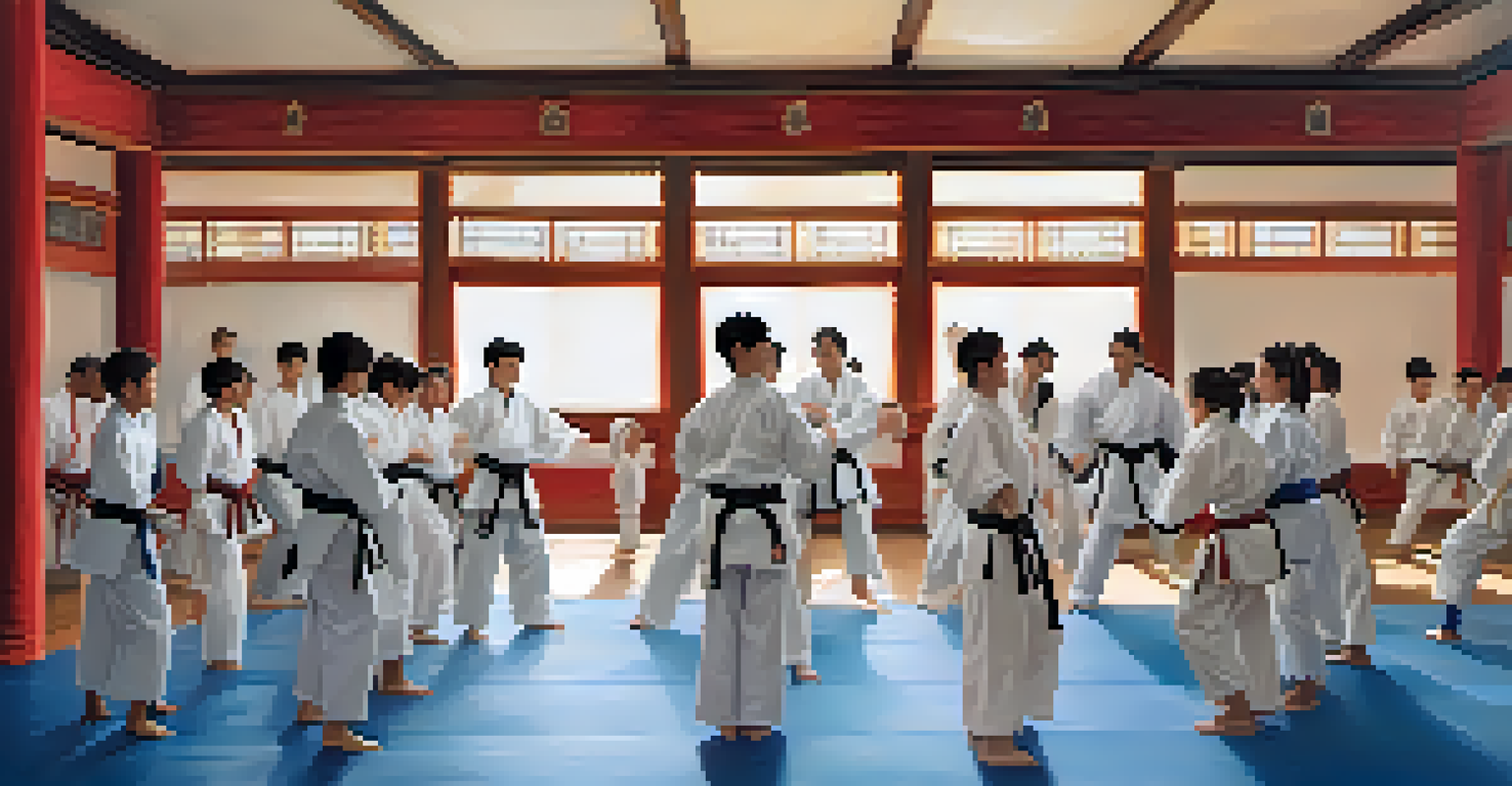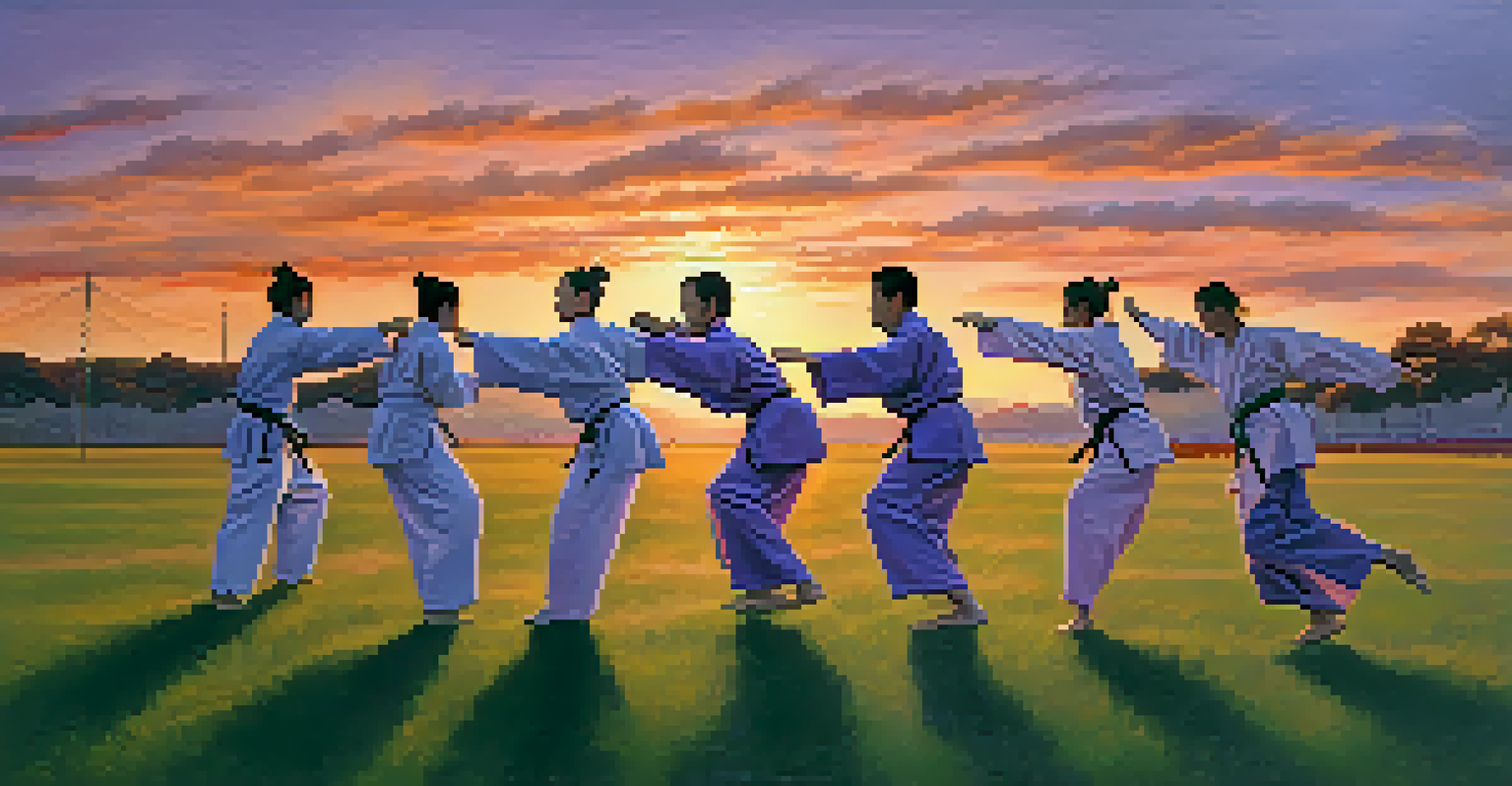Martial Arts: A Pathway to Improved Mental Health for All

Understanding the Connection Between Mind and Body
Martial arts is often viewed as a physical discipline, but its benefits extend far beyond the body. The practice emphasizes the connection between mental focus and physical movement, encouraging practitioners to be aware of their thoughts and emotions. This mind-body connection is crucial in enhancing mental resilience and overall well-being.
The mind is everything. What you think you become.
Just like a tree needs strong roots to withstand storms, our mental health needs a solid foundation built on self-awareness and discipline. By engaging in martial arts, individuals learn to control their thoughts and reactions, which can lead to greater emotional stability. This practice of mindfulness can help in reducing stress and anxiety levels.
Imagine standing firm in a martial stance, feeling your breath synchronize with your movements. This practice not only cultivates physical strength but also nurtures a calm and focused mind, making it easier to handle life's challenges. Ultimately, martial arts can serve as a powerful tool for mental fortitude.
Stress Relief Through Physical Activity
One of the most immediate benefits of practicing martial arts is stress relief. Engaging in physical activity releases endorphins, the body's natural feel-good hormones, which can significantly elevate your mood. This physiological response is similar to the feeling of euphoria after a good workout, helping to combat daily stressors.

Consider how a quick bout of shadowboxing can clear your mind after a hectic day. The repetitive motions and focus required in martial arts provide a mental break from overwhelming thoughts. By channeling stress into physical movement, practitioners often find themselves more relaxed and better equipped to face challenges.
Mind-Body Connection Boosts Wellness
Practicing martial arts enhances mental resilience and emotional stability through the connection between mental focus and physical movement.
Moreover, the structured environment of martial arts training fosters a sense of community and support. Being part of a class creates bonds with like-minded individuals, reducing feelings of isolation. This social aspect, combined with physical activity, enhances emotional well-being.
Building Confidence and Self-Esteem
Martial arts training is inherently progressive, allowing participants to set and achieve personal goals, which can significantly boost self-esteem. Each belt earned or skill mastered serves as a tangible representation of growth and accomplishment. This journey of improvement fosters a sense of pride and confidence that extends beyond the dojo.
Success is not the key to happiness. Happiness is the key to success. If you love what you are doing, you will be successful.
Think about the first time you successfully executed a difficult move. The rush of achievement is not just about mastering a technique; it's about proving to yourself that you can overcome obstacles. This newfound confidence can translate into other areas of life, from professional pursuits to personal relationships.
As practitioners face challenges within their training, they learn resilience and perseverance. These skills are invaluable in daily life, encouraging individuals to tackle problems head-on rather than shying away. Ultimately, martial arts cultivates a mindset of growth that enhances overall mental health.
Enhanced Focus and Concentration Skills
Practicing martial arts requires intense focus and concentration, skills that can easily be applied to everyday life. The discipline involved in learning techniques and forms sharpens mental acuity and improves the ability to concentrate on tasks. This heightened focus can lead to better performance in both academic and professional settings.
Consider how a martial artist must be present in the moment during training. They learn to tune out distractions and hone in on their breathing and movements. This practice of concentration can be beneficial in managing time and prioritizing tasks effectively in our busy lives.
Stress Relief Through Movement
Engaging in martial arts provides immediate stress relief by releasing endorphins and fostering a supportive community.
As individuals develop their focus through martial arts, they often find it easier to tackle complex problems and make decisions. This mental clarity not only enhances productivity but also contributes to a more balanced and fulfilling life.
Emotional Regulation and Control
Martial arts teaches practitioners how to regulate their emotions in high-pressure situations. Through sparring and competition, individuals learn to manage feelings like fear, frustration, and excitement, promoting emotional intelligence. This skill is essential for navigating personal relationships and professional environments.
Imagine facing an opponent in a sparring match, where emotions can run high. The ability to stay calm and composed can determine the outcome of the match, and this practice of emotional control can translate into real-life scenarios. Whether it's a stressful meeting at work or a heated conversation at home, martial arts equips individuals with the tools to respond thoughtfully.
Furthermore, the practice encourages reflection on one's emotions, leading to greater self-awareness. Understanding how to identify and manage feelings can lead to healthier coping mechanisms, ultimately enhancing mental health.
Community and Support Networks
Joining a martial arts class often means becoming part of a supportive community. This sense of belonging is crucial for mental health, as it fosters connections and friendships with others who share similar interests. The camaraderie built during training can provide emotional support and encouragement.
Think about the bonds formed during group training sessions or after a tough sparring match. These shared experiences help to create a tight-knit community, where individuals lift each other up and celebrate victories together. This social interaction is vital for maintaining mental well-being.
Building Confidence and Resilience
Martial arts training promotes self-esteem and a growth mindset by allowing individuals to set and achieve personal goals.
Moreover, having a community to rely on can alleviate feelings of loneliness or isolation. In times of stress or uncertainty, knowing that others are there to support you can make a world of difference, reinforcing the importance of connection in martial arts.
Lifelong Benefits of Martial Arts for Mental Health
The benefits of martial arts extend well beyond the training mat. As individuals continue to practice, they often notice lasting improvements in their mental health, including reduced anxiety, improved mood, and greater emotional stability. The skills learned through martial arts can be applied throughout life, promoting a healthier mindset.
Consider how the discipline and focus cultivated in martial arts can become lifelong habits. With consistent practice, individuals develop a toolkit for managing stress, facing challenges, and achieving personal goals. These skills not only make daily life more manageable but also contribute to long-term mental resilience.

Ultimately, martial arts is more than just a physical activity; it's a holistic approach to mental health that encourages growth, connection, and emotional well-being. Engaging in this practice can empower individuals to take charge of their mental health journey, creating a path toward a more balanced and fulfilling life.